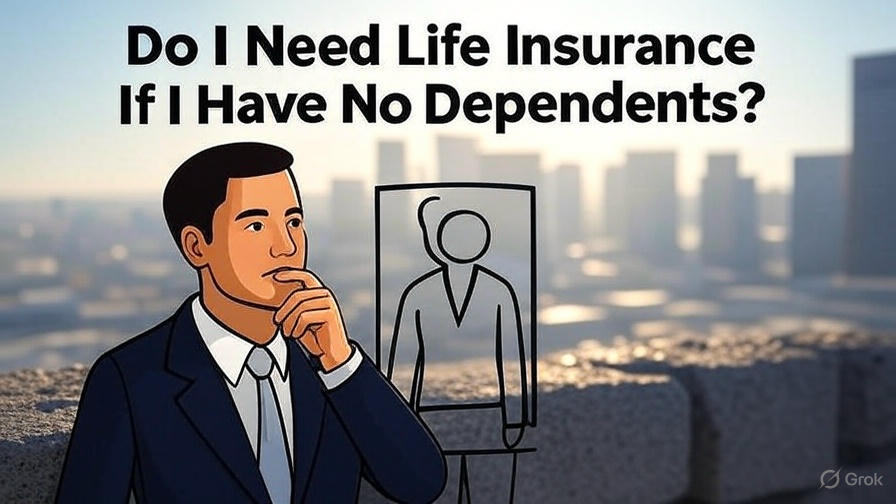Life insurance is often marketed as a must-have for financial security. It promises to protect your loved ones by providing a payout after your death, covering everything from funeral costs to ongoing living expenses. But not everyone is convinced. Many people, especially when it comes to whole life insurance, label it a scam.
High costs, low returns, and aggressive sales tactics fuel this perception. In this article, we’ll explore why some call life insurance a scam, examine the different types of policies, and help you decide if it’s worth your money. We’ll also look at how to avoid actual scams in the industry and make informed choices.
Table of Contents
What Is Life Insurance?
At its core, life insurance is a contract. You pay regular premiums, and the insurance company agrees to pay a death benefit to your beneficiaries when you pass away. The goal is to provide financial support for your family, helping with expenses like mortgages, debts, or daily living costs. Life insurance comes in several forms, each with its own features and costs. Understanding these is key to seeing why some policies are criticized.
Types of Life Insurance
Here’s a breakdown of the main types:
- Term Life Insurance: Covers you for a set period, like 10, 20, or 30 years. If you die during the term, your beneficiaries get the payout. If you outlive it, the policy expires with no return. It’s affordable and straightforward, often costing $20-$100 a month for a $500,000 policy for a healthy 30-year-old (Forbes Advisor).
- Whole Life Insurance: Provides coverage for your entire life, as long as premiums are paid. It includes a cash value component that grows over time, which you can borrow against or withdraw. Premiums are much higher, often $200-$500 a month for similar coverage.
- Universal Life Insurance: A flexible permanent policy where you can adjust premiums and death benefits. It also has a cash value, but returns vary based on market conditions or insurer performance.
- Variable Life Insurance: Similar to universal life, but the cash value is tied to investment options like stocks or bonds, making it riskier.
Each type serves different needs, but whole life insurance is where most of the “scam” accusations arise. Let’s dive into why.
Why Some Call Life Insurance a Scam
The idea that life insurance is a scam often stems from whole life insurance and the way it’s sold. Here are the main reasons people feel misled:
1. High Costs of Whole Life Insurance
Whole life insurance is expensive. Premiums can be 5-10 times higher than term life for the same death benefit. For example, a 30-year-old might pay $100 a month for a $500,000 term policy but $300-$500 for a whole life.
Over 30 years, that’s $36,000-$60,000 for term versus $108,000-$180,000 for whole life. The higher cost comes from lifelong coverage and the cash value component, but many argue it’s not worth it.
2. Poor Returns on Cash Value
Whole life policies include a cash value that’s supposed to grow over time, acting as a savings or investment vehicle. However, the growth is slow, often 1-2% annually after fees, compared to 7-10% for stock market investments.
Fees, including management and administrative costs, eat into returns. If you borrow against the cash value, you may face interest charges, and withdrawing funds can reduce the death benefit. Many financial experts argue you’re better off buying term life and investing the difference elsewhere.
3. Mis-selling by Agents
Insurance agents earn higher commissions on whole life policies—sometimes 50-100% of the first year’s premium, compared to 10-20% for term life (Money with Katie). This creates an incentive to push whole life, even when it’s not the best fit. Common tactics include:
- High-Pressure Sales: Agents may urge you to buy quickly, using phrases like “You need this to protect your family” or “This is a great investment.”
- Misleading Claims: Some agents present whole life as a “forced savings plan” or a “safe investment,” downplaying the high costs and low returns.
- Targeting Trust: Agents often sell to friends or family, leveraging familiarity to lower your guard.
These tactics can leave buyers feeling scammed when they realize the policy doesn’t meet their needs.
4. Complexity and Lack of Transparency
Whole life policies are complex. The cash value, fees, and how premiums affect the death benefit can be hard to understand. Many buyers don’t realize they’re locked into high premiums for life or that accessing the cash value comes with strings attached. This lack of clarity fuels distrust, especially when buyers feel misled by agents.
5. Not Always Necessary
Not everyone needs life insurance. If you have no dependents, no significant debts, or enough savings to cover final expenses, you might not need a policy. Even for those who do, term life often suffices. Whole life is often sold to people who don’t need lifelong coverage, making it feel like a waste of money.
6. Actual Scams in the Industry
Beyond product criticisms, the life insurance industry has real scams that damage its reputation:
- Fake Policies: Scammers pose as agents and sell nonexistent policies, pocketing your premiums.
- Premium Diversion: Dishonest agents collect premiums but don’t forward them to the insurer, leaving you uninsured.
- Unsolicited Offers: You might receive calls or emails claiming you’re a beneficiary of a policy you never bought, designed to steal your personal information.
These scams don’t mean all life insurance is fraudulent, but they contribute to the negative perception.
When Life Insurance Might Be Unnecessary
Life insurance isn’t a one-size-fits-all product. Here are scenarios where it might not be worth it:
- No Dependents: If you’re single with no children or others relying on your income, you may not need life insurance.
- Sufficient Savings: If you have enough savings to cover debts and final expenses, a policy might be redundant.
- Tight Budget: If high premiums strain your finances, term life or no insurance might be better than overpaying for whole life.
- Other Financial Plans: If you’re investing in retirement accounts or other assets, these might provide enough security for your family.
For most people, term life is the go-to choice because it’s affordable and covers specific needs, like protecting your family until your kids are grown or your mortgage is paid off.
Alternatives to Life Insurance
If you’re skeptical about life insurance, consider these alternatives:
- Emergency Fund: Build a savings account to cover unexpected expenses or final costs.
- Investments: Put money into low-cost index funds or retirement accounts for higher returns than whole life’s cash value.
- Debt Reduction: Pay off debts like mortgages or student loans to reduce the financial burden on your family.
- Estate Planning: Create a will or trust to ensure your assets are distributed as you wish.
These options can provide financial security without the high costs of whole life insurance.
When Life Insurance Is Beneficial
Despite the criticisms, life insurance can be valuable in certain situations:
- Dependents Rely on Your Income: If you have a spouse, children, or others who depend on your earnings, term life can replace your income if you die unexpectedly.
- Significant Debts: Life insurance can cover debts like a mortgage, ensuring your family isn’t burdened.
- Lifelong Coverage Needs: Whole life might suit those who want guaranteed coverage for life, such as for estate planning or leaving an inheritance.
- Business Owners: Life insurance can protect a business by funding buy-sell agreements or covering key person losses.
- Forced Savings: For those who struggle to save, whole life’s cash value can act as a savings vehicle, though it’s not the most efficient.
Term life is generally recommended for its affordability, while whole life might appeal to those with specific long-term needs.
How to Choose the Right Life Insurance Policy
To avoid feeling scammed, follow these steps:
- Assess Your Needs: Determine why you need insurance. Is it for a specific period (e.g., until your kids are independent) or for life? This will guide whether term or whole life is better.
- Compare Quotes: Get quotes from multiple insurers. Online tools or independent agents can help you compare.
- Understand the Policy: Ask about premiums, death benefits, fees, and how the cash value works (if applicable). Don’t sign until you’re clear on the terms.
- Verify Credentials: Check that the agent is licensed and the company is reputable. Your state’s insurance department or the Better Business Bureau can help.
- Avoid High-Pressure Sales: If an agent pushes you to buy quickly, walk away. Take time to research and decide.
- Read the Fine Print: Look for exclusions, limitations, or penalties for withdrawing cash value or canceling the policy.
Common Life Insurance Scams to Watch For
Here are some scams to avoid:
| Scam Type | Description | How to Avoid |
| Fake Policies | Scammers sell nonexistent policies, taking your premiums without coverage. | Verify the agent and company with your state’s insurance department. |
| Premium Diversion | Agents pocket your premiums instead of sending them to the insurer. | Pay directly to the insurance company, not the agent. |
| Unsolicited Offers | Calls or emails claiming you’re a beneficiary or there’s a policy issue. | Don’t share personal information; contact your insurer directly to verify. |
| Too-Good-to-Be-True Rates | Advertised low rates that don’t apply to most people or hide high fees. | Read the fine print and compare quotes from multiple insurers. |
| Churning | Agents push you to replace an existing policy with a new one for their commission. | Ask for documentation showing how the new policy benefits you. |
Conclusion
Life insurance isn’t a scam in itself—it’s a legitimate tool that can provide peace of mind and financial security. However, whole life insurance often draws criticism for its high costs, low returns, and aggressive sales tactics. Actual scams, like fake policies or premium diversion, further tarnish the industry’s reputation.
For most people, term life insurance is a cost-effective choice that meets their needs without the complexity or expense of whole life. By understanding your needs, comparing options, and staying vigilant, you can avoid pitfalls and choose a policy that truly protects your loved ones.

